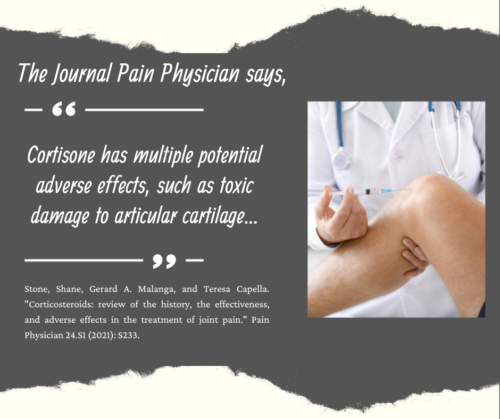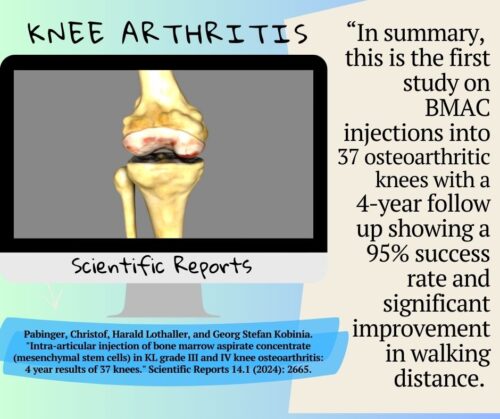
Cortisone Injections Are Toxic to Cartilage
Have you been told your knee is bone on bone and the only thing that will help is a knee replacement? We see many patients who have received that same report and have been able to offer them an alternative. Regenerative Orthopedics are effective non-surgical alternatives for knee pain, knee dysfunction, and even bone-on-bone knees.
At OrthoRegen®, we utilize regenerative treatments to repair injured and degenerated knees. These treatments include Stem Cells, PRP, and Prolotherapy. Certain knee conditions will respond well to simple dextrose Prolotherapy. Other conditions respond great with PRP. And then other conditions, usually those with more degeneration, will require stem cell treatment. All of the treatments are done in conjunction with dextrose Prolotherapy to treat the entire knee joint comprehensively.
In this article, we will explore various treatment options and what the research says about them.
The anti-inflammatory nature of cortisone may provide some initial relief. However, cortisone can make bone on bone arthritis worse due to its toxicity to the cartilage. That’s unfortunate news considering cortisone is the main course of treatment for arthritis. However, studies show that cortisone injections boost the degeneration of soft tissue.
“The current evidence would suggest that the use of corticosteroids provides moderate evidence for short-term pain reduction and improvement in function. There are multiple potential adverse effects, such as toxic damage to articular cartilage, as well as numerous systemic side effects, including a reduction in immune function and an increased risk of infection, of which physicians need to be aware.” (1)
Over a two-year period, researchers in another study compared 70 patients with osteoarthritis who had received intraarticular cortisone knee injections to a control group of 140 with osteoarthritis who did not get injections. The data showed more arthritis progression in patients who had steroid shots. (2)
How does PRP compare to cortisone? A British medical journal reviewed eight studies that compared cortisone with PRP, and the results showed that PRP was significantly better at reducing arthritis symptoms such as pain, stiffness, and functionality at a year follow-up. (3)
Read more studies on arthritis and cortisone by clicking here.
Hyaluronic acid injections will provide a gel-like cushion in the knee that may help to alleviate your bone-on-bone symptoms. These injections are designed as short-term treatments to help put off or delay knee replacement surgery.
The treatment is referred to as viscosupplementation – because the injections supplement the “viscosity” or the thick, sticky, gel-like properties of the synovial fluid. Hyaluronic acid is naturally occurring in the synovial fluid of the knee.
“Although some patients report relief of arthritis symptoms with viscosupplementation, the procedure has never been shown to reverse the arthritic process or re-grow cartilage.” (4)
A 2022 study from Melbourne, Australia, reports, “High-certainty evidence indicates arthroscopic surgery leads to little or no difference in pain or function at three months after surgery, moderate-certainty evidence indicates it is probably little or no improvement in knee-specific quality of life three months after surgery, and low-certainty evidence indicates arthroscopic surgery may lead to little or no difference in participant-reported success at up to five years, compared with placebo surgery.” (5)
Surgery is also invasive and often requires a prolonged recovery time. Regenerative Orthopedics are non-surgical alternatives. We see a lot of patients who prefer the non-surgical route to avoid a long surgical recovery and the risks that come with surgery. They desire to get back to an active life and do what they love. Does that sound like you?
Regenerative Orthopedics regenerates the joint. The treatments do not cause the degeneration that occurs with cortisone injections. Additionally, there is also minimal downtime needed when receiving these regenerative treatments. That means you can continue to exercise and move the joint, which is essential for a healthy joint. Exercise helps ease pain, improve mobility, and strengthen muscles around the joints.
Your blood platelets contain potent growth factors necessary to begin tissue repair and regeneration at the injury site. Concentrated platelets contain large reservoirs of growth factors that can greatly and naturally accelerate the normal healing process. The use of concentrated growth factors is considered by many to be an exciting and new cutting edge therapy that can stimulate tissue repair and regenerate weakened torn or damaged ligaments, ligaments, and joints.

Mesenchymal stem cells (MSCs) are pluripotent cells found in human adult tissue such as bone marrow and adipose tissue. MSCs have been found to regenerate cartilage successfully. That’s a great finding when it comes to the arthritic knee. When the degeneration is more severe, stem cells may be needed.
Researchers in the Scientific Reports journal found that BMAC (stem cell) injections into 37 osteoarthritic knees with a 4‐year follow up showed significant improvements including a 95% success rate and significant improvement in walking distance. (7)
For adult stem cells to work best, they require growth factors. Since growth factors are found in platelets, a blood isolate called Platelet Rich Plasma (PRP) is used along with the stem cells. PRP is a concentration of a patient’s own platelets taken from a blood draw which is concentrated in a specialized centrifuge. PRP injections use each patient’s own healing system to improve musculoskeletal problems.
A large 2023 FDA approved study revealed no serious adverse effects or knee infections. Almost all side effects, such as procedural or post-procedural pain were resolved by the 1-week follow up. (6) Another large study by Centeno et al. concluded the same. (8)
If you’ve been told that you have bone on bone knee arthritis and need to have joint replacement surgery, you owe it to yourself to examine all other alternatives to surgery.
Make an appointment with Dr. Peter Fields for an evaluation to see if you are a good candidate. Call 310-453-1234 to make an appointment now.
Stone, Shane, Gerard A. Malanga, and Teresa Capella. “Corticosteroids: review of the history, the effectiveness, and adverse effects in the treatment of joint pain.” Pain Physician 24.S1 (2021): S233.
PR Newswire. NSAIDs May Worsen Arthritis Inflammation. https://www.prnewswire.com/news-releases/nsaids-may-worsen-arthritis-inflammation-301681834.html. Accessed 12/2/23.
McLarnon, Michael, and Neil Heron. “Intra-articular platelet-rich plasma injections versus intra-articular corticosteroid injections for symptomatic management of knee osteoarthritis: systematic review and meta-analysis.” BMC musculoskeletal disorders 22.1 (2021): 550.
Altman R, Lim S, Steen RG, Dasa V. Correction: Hyaluronic acid injections are associated with delay of total knee replacement surgery in patients with knee osteoarthritis: Evidence from a Large US Health Claims Database. PLoS One. 2016 Jan 29;11(1):e0148591.
O’Connor D, Johnston RV, Brignardello-Petersen R, Poolman RW, Cyril S, Vandvik PO, Buchbinder R. Arthroscopic surgery for degenerative knee disease (osteoarthritis including degenerative meniscal tears). Cochrane Database of Systematic Reviews. 2022(3).
Mautner, Ken, et al. “Cell-based versus corticosteroid injections for knee pain in osteoarthritis: a randomized phase 3 trial.” Nature medicine (2023): 1-7.
Centeno, C. J. et al. A multi-center analysis of adverse events among two thousand, three hundred and seventy two adult patients undergoing adult autologous stem cell therapy for orthopaedic conditions. Int. Orthop. 40, 1755–1765 (2016).